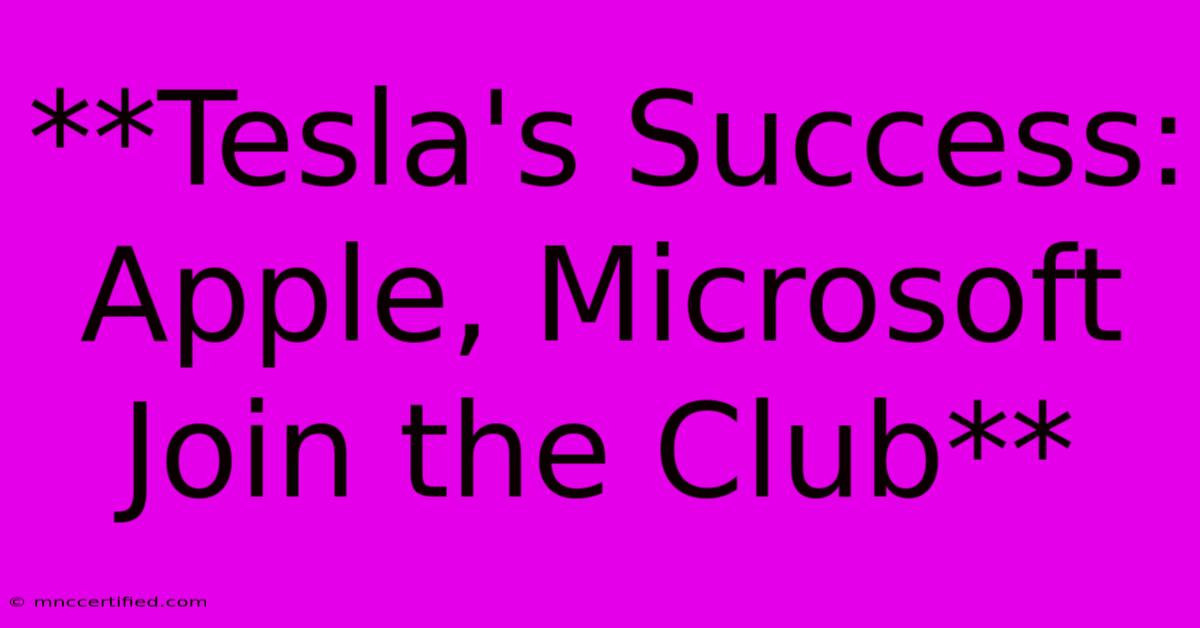**Tesla's Success: Apple, Microsoft Join The Club**

Table of Contents
Tesla's Success: Apple, Microsoft Join the Club
Tesla, the electric vehicle (EV) giant, has shaken up the automotive industry and become a household name. Its success isn't just about electric cars; it's about a unique blend of innovation, technology, and brand loyalty. This success has now become a blueprint for other tech giants, with Apple and Microsoft recently entering the EV market. But can they replicate Tesla's success?
The Tesla Effect: More Than Just Electric Cars
Tesla's rise is remarkable. From a small startup to a global leader in EVs, it's captivated the world with its sleek designs, advanced technology, and commitment to sustainability. But what sets Tesla apart from traditional automakers?
- Tech-Centric Approach: Tesla's cars are more than just vehicles; they are rolling computers. The integration of software, AI, and a user-centric interface has redefined the driving experience, appealing to a tech-savvy audience.
- Brand Loyalty: Tesla has built a fervent following among enthusiasts, creating a loyal community around its brand. This loyalty extends beyond the cars, encompassing the company's mission and values.
- Vertical Integration: Tesla controls most of its supply chain, from battery production to software development. This allows for tighter control over quality, innovation, and pricing.
Apple and Microsoft Enter the Electric Race
The success of Tesla hasn't gone unnoticed. Two tech giants, Apple and Microsoft, are now entering the EV market with their own unique strategies:
Apple: Rumors of Apple's "Apple Car" have been circulating for years. The company is known for its sleek design and user-friendly interface, and it's expected to bring those qualities to its EV. Apple's potential strengths lie in its existing ecosystem of products and services, creating a seamless integration with smartphones and other devices.
Microsoft: Microsoft's approach is more focused on software and technology. They're collaborating with automakers to provide cloud-based services, autonomous driving solutions, and connected car experiences. Microsoft's expertise in software and AI can help transform the automotive industry, but it's unlikely to build its own cars in the near future.
Can They Replicate Tesla's Success?
While both Apple and Microsoft have the resources and expertise to make a significant impact in the EV market, replicating Tesla's success won't be easy.
Challenges:
- Established Competition: The EV market is becoming increasingly crowded, with established automakers like Ford, General Motors, and Volkswagen making significant investments in electric vehicles.
- Tesla's Head Start: Tesla has a significant lead in terms of technology, infrastructure, and brand loyalty. Catching up will be challenging.
- Production and Supply Chain: Scaling up EV production requires significant manufacturing capabilities and a robust supply chain. This is an area where both Apple and Microsoft lack experience.
Opportunities:
- Apple's Ecosystem: Apple's existing ecosystem of devices and services could give it a competitive advantage, attracting users who want a seamless connected experience.
- Microsoft's Software Expertise: Microsoft's software and AI capabilities can help transform the automotive industry, providing valuable services and solutions to carmakers.
The Future of Electric Vehicles
The entrance of Apple and Microsoft marks a significant shift in the automotive industry. With their vast resources and innovative spirit, they have the potential to revolutionize the EV market.
The future of electric vehicles is bright, with continued technological advancements and increased consumer demand. While the competition is fierce, the combined expertise of tech giants and traditional automakers promises a future of more sustainable, intelligent, and exciting cars.

Thank you for visiting our website wich cover about **Tesla's Success: Apple, Microsoft Join The Club** . We hope the information provided has been useful to you. Feel free to contact us if you have any questions or need further assistance. See you next time and dont miss to bookmark.
Featured Posts
-
Referee Coote Suspended Amid Video Evidence
Nov 12, 2024
-
Stephen Miller Back At Trumps White House
Nov 12, 2024
-
Barcelonas Yamal Injury How Long Out
Nov 12, 2024
-
Real Estate Investing North Carolina
Nov 12, 2024
-
Conte Rants Var Protocol After Napoli Draw
Nov 12, 2024